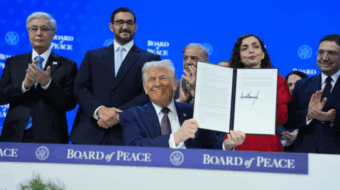Israeli Prime Minister Ariel Sharon’s much touted Disengagement Plan from Gaza and small portions of the West Bank focuses the world’s attention on the tug-of-war between the Israeli army and the Israeli settler movement. At the same time it obscures the absence of any meaningful peace process in the Israeli/Palestinian conflict.
Around the world, the media show heated and emotional clashes between Israeli army or police units and settlers’ supporters who seek to derail the disengagement process. These made-for-TV mini-dramas are just the sort of fare the media craves: emotional clashes of bodies and ideas as settlers try to convince soldiers to disobey orders and refuse to remove them.
While the media focus is on Israeli settlers trying to infiltrate Gaza to support residents of Gush Khatif, their violence goes on in the forms of harassment, beatings, intimidation and destruction of Palestinian property, agriculture and livestock. These daily violations of human rights receive little or no press coverage.
There is also little discussion about where settlers are being resettled, or the fact that these persons being “redeployed” from illegal settlements in Gaza will be given large amounts of cash, new homes and the opportunity to harass new Palestinian neighbors in the Negev and Galilee, just like they did in Gaza.
All the while the peace process is nowhere to be seen. At each meeting between representatives of the Israeli government and the Palestinian Authority, no substantial issues related to the peace process are discussed. The conversation is confined to the narrow issues surrounding the disengagement and how, or if, Israel will allow the Palestinians to cooperate with the unilateral process.
At the same time, violence continues to claim more lives. Israel’s policy of “targeted assassinations” is taking more lives even though the process was officially “suspended” earlier this year, because it was deemed ineffective by the military itself. The handover of Palestinian towns and villages to the Palestinian Authority has trickled to a halt, while the army increases its re-invasions, arrests and killings of Palestinian activists. According to the Palestinian Red Crescent Society, between March 1 and July 30, 2005, 63 Palestinians were killed by Israelis in the West Bank and Gaza, despite the truce agreed to by Prime Minister Sharon and President Abbas.
In addition, Palestinian paramilitary groups — frustrated with the lack of progress on substantial issues, or unwilling to allow Israel to withdraw quietly from Gaza — continue to rain homemade rockets onto Israeli settlements in Gaza, killing several Israeli civilians in the barrages. Suicide bombers in February and July of this year also took the lives of more than half a dozen Israelis.
Meanwhile, Prime Minister Ariel Sharon has continued the expropriation of Palestinian land. The decision to remove settlers from Gaza was accompanied by an announcement that the population of the Israeli settlement Maale Adumim in the West Bank would be increase by over 30,000 people. The Israeli government has also sped up construction of the Separation Wall in an effort to force Palestinians out of Jerusalem and nearby communities, and to restrict more Palestinians to isolated enclaves. More Palestinian areas of Jerusalem are being slated for destruction in order to ensure the demographic Jewish control of Jerusalem.
Thus, the disengagement plan has achieved its goal of “putting the peace process in formaldehyde,” as Sharon confidant Dov Weissglas said in an interview with the Israeli newspaper Ha’aretz in 2004. No progress has occurred since the Sharm Al Sheik meeting in Egypt in February 2005 on items of substance regarding final status issues: borders, water resource allocation, refugees, or the nature of a Palestinian state. Ariel Sharon’s goal of creating the illusion of a peace process out of the process of disengagement is succeeding.
The Israeli nongovernmental organizations B’Tselem and HaMoked issued a joint report in April 2005 criticizing the Israeli government for its assault on the human rights of the residents of Gaza, and its control of borders as well as air, water and land access to Gaza that result in the area being “One Big Prison.”
The report says: “In approving the disengagement plan, the government of Israel stated its intention to evade its natural and almost self-evident responsibility for the human rights of Palestinian residents of the Gaza Strip. However, all the human rights violations discussed in this report are likely to continue, and perhaps even worsen, after disengagement, unless Israel recognizes its responsibility for the human rights to which Gazans are entitled.”
On the eve of the disengagement, it is crucial that the international community demand that the departure of Israeli settlers from Gaza is in fact a move towards Palestinian self-determination, and not simply a diversion from continued Israeli occupation policies.
Paul Pierce is Quaker International Affairs Representative in Jerusalem for the American Friends Service Committee. This article is reprinted with permission from the AFSC web site, .









